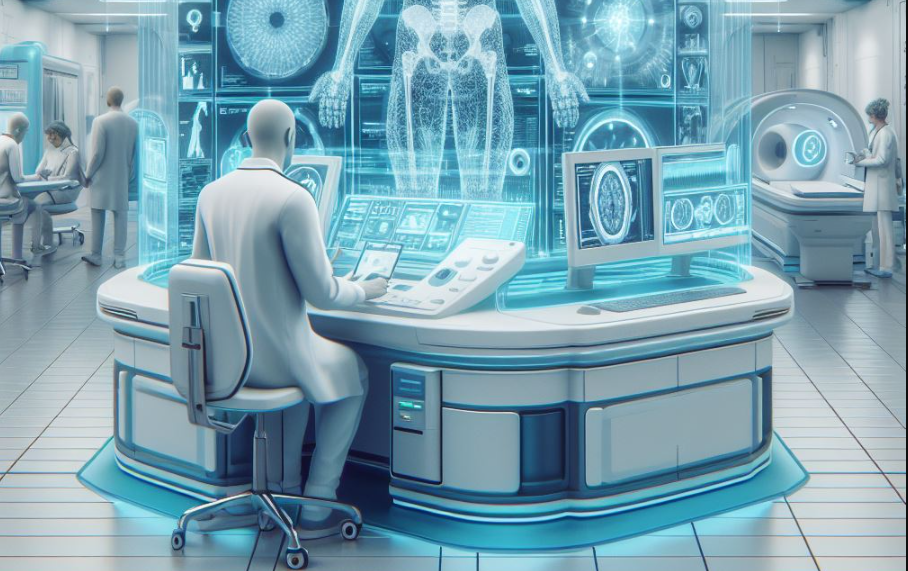 AI
AI
 AI
AI
 AI
AI
Google Cloud took the opportunity at its annual developer conference Next ‘24 today to showcase how various major customers are taking advantage of its advanced artificial intelligence capabilities. Not surprisingly in this day and age, it was especially keen to show off its chops in generative AI, revealing how the German pharmaceutical giant Bayer AG is using the technology to enhance radiology, and how Best Buy Co. Inc. has deployed advanced chatbots to enhance its customer support services.
The collaboration with Bayer is aimed at using generative AI to support radiologists by building more powerful and scalable medical imaging tools that can make their jobs much easier, saving them time and leading to better patient outcomes.
Google explained that radiology is an obvious application for generative AI, because it’s one of the most important diagnostic tools used in healthcare today. Moreover, medical images account for around 90% of all healthcare data, so there are plenty of examples to hand for training AI models.
According to Google, the problem it’s trying to solve is that radiologists collectively have to analyze millions of images every year. By using generative AI to analyze these images and suggest diagnoses instead, Bayer has been able to save radiologists hours of time, freeing them up to perform additional tasks, such as planning the best possible treatment for their patients.
Bayer’s generative AI-powered radiology tool was built using Google Cloud’s Vertex AI platform and relies on services such as BigQuery, Google’s Healthcare API and Chronicle. The platform is still in production, but Bayer said it hopes to make a first version available for extended testing in the EU and the U.S. later this year.
Nelson Ambrogio, president of radiology at Bayer, said there is a great need for a system that can efficiently and accurately uncover insights from medical images. “Through the collaboration with Google Cloud, our joint efforts will help organizations in the healthcare and life science industry transform the growing amounts of data into valuable and impactful insights, saving radiologists time and helping them optimize their important work for the benefit of patients,” he said.
In addition to radiology, Bayer is also working with Google Cloud to use generative AI in other areas, such as drug discovery and patient diagnosis.
Best Buy said it has developed a range of new generative AI agents in collaboration with Google Cloud that aim to transform customer experiences and improve their overall satisfaction while saving them time.
Its new solutions, built with Vertex AI using Google’s family of Gemini models, include a generative AI-powered virtual self-support assistant that’s planned to launch in the summer. When it launches, visitors to Best Buy’s website and mobile app will be able to ask the agent to help with things like troubleshooting product issues, rescheduling or combining deliveries, managing software, subscriptions and Best Buy memberships.
There’s also a new, AI-enhanced customer care agent in the world that will help to ease the load on Best Buy’s human call center operators. They’re designed to assess the customer’s problem and either offer a solution, or hand-off the call to the most appropriate human agent once the customer’s issue has been identified. In addition, the agents will be able to recap conversations, detect customer sentiment and provide agents with real-time recommendations to help resolve customer’s issues.
A similar use case for generative AI is being implemented by Discover Financial Services, which is using Google Cloud’s Vertex AI platform to deliver customer care chatbots that will enhance its customer support services with faster and more personalized resolutions, and make life easier for its call center operators.
Discover said it plans to empower almost 10,000 contact center operators globally with multiple generative AI tools. These include intelligent document summarization tools for analyzing complex policies and procedures, so call center agents can provide customers with the information they need more rapidly. It’s also creating a real-time search assistant that uses natural language processing techniques, so agents can simply ask it in their natural voice for the information they need to help customers.
“Today more than ever, customers expect exceptional service, and our collaboration with Google Cloud will help us not only meet, but also exceed those expectations,” said Szabolcs Paldy, senior vice president of operations at Discover.
The hospitality firm IHG Hotels & Resorts said it’s planning to leverage generative AI to create a new tool to help its customers plan their vacations. The tool will be integrated within the IHG One Rewards mobile app as part of a suite of new features planned to launch later this year, with the goal being to create more dynamic digital guest experiences.
The new feature will be called the IHG Travel Planner, and it will provide recommendations and ideas for both broad and nuanced requests, Google said. So the customer might ask for “four late-night dinner options near the InterContinental London Park Lane” or “Does the Kimpton Shinjuku Hotel in Tokyo allow pets?” and instantly receive the suggestions or answers they’re looking for.
IHG said its travel planner is being built using Vertex AI and powered by Google’s Gemini models, hosted on the Google Cloud platform.
Support our mission to keep content open and free by engaging with theCUBE community. Join theCUBE’s Alumni Trust Network, where technology leaders connect, share intelligence and create opportunities.
Founded by tech visionaries John Furrier and Dave Vellante, SiliconANGLE Media has built a dynamic ecosystem of industry-leading digital media brands that reach 15+ million elite tech professionals. Our new proprietary theCUBE AI Video Cloud is breaking ground in audience interaction, leveraging theCUBEai.com neural network to help technology companies make data-driven decisions and stay at the forefront of industry conversations.